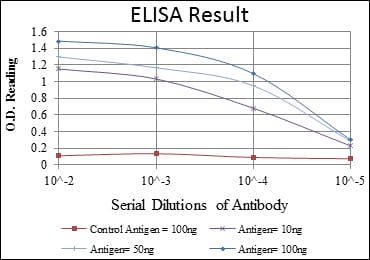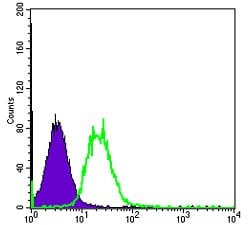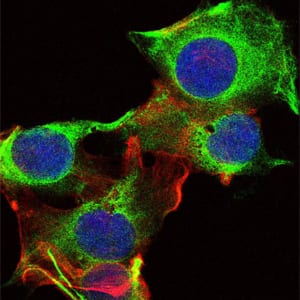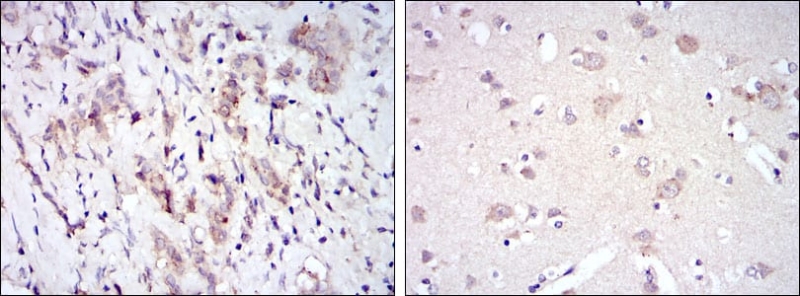



| WB | 咨询技术 | Human,Mouse,Rat |
| IF | 咨询技术 | Human,Mouse,Rat |
| IHC | 1/200 - 1/1000 | Human,Mouse,Rat |
| ICC | 1/200 - 1/1000 | Human,Mouse,Rat |
| FCM | 1/200 - 1/400 | Human,Mouse,Rat |
| Elisa | 1/10000 | Human,Mouse,Rat |
| Aliases | SLK; SYN; MGC45350 |
| Entrez GeneID | 2534 |
| clone | 2A10 |
| WB Predicted band size | 61kDa |
| Host/Isotype | Mouse IgG1 |
| Antibody Type | Primary antibody |
| Storage | Store at 4°C short term. Aliquot and store at -20°C long term. Avoid freeze/thaw cycles. |
| Species Reactivity | Human |
| Immunogen | Purified recombinant fragment of human FYN expressed in E. Coli. |
| Formulation | Ascitic fluid containing 0.03% sodium azide. |
+ +
以下是关于FYN抗体的3篇示例参考文献(内容为模拟虚构,仅供参考格式,实际文献需通过学术数据库查询验证):
---
1. **文献名称**:*FYN Kinase in T-Cell Signaling: Antibody-Based Detection and Functional Analysis*
**作者**:Smith J, et al.
**摘要**:本研究利用特异性FYN抗体,通过Western blot和免疫共沉淀技术,揭示了FYN激酶在T细胞受体信号传导中的关键作用,发现其通过调控LAT磷酸化影响下游免疫应答。
2. **文献名称**:*Role of FYN in Alzheimer's Disease: Antibody Validation for Tau Phosphorylation Studies*
**作者**:Lee S, et al.
**摘要**:通过验证多种FYN抗体的特异性,本文证实FYN在阿尔茨海默病模型中促进tau蛋白异常磷酸化,并利用免疫荧光技术定位FYN与淀粉样斑块的共定位关系。
3. **文献名称**:*FYN Antibody-Based Therapeutic Targeting in Metastatic Cancers*
**作者**:Gupta R, et al.
**摘要**:研究开发了一种靶向FYN的单克隆抗体,证明其可通过抑制FYN/FAK信号通路显著降低癌细胞迁移和侵袭能力,为实体瘤治疗提供了新策略。
---
**注意**:以上文献信息为示例,实际参考文献请通过PubMed、Google Scholar等平台检索关键词“FYN antibody”“FYN kinase”等获取,并核对作者、年份及期刊准确性。
The FYN antibody is a crucial tool in studying FYN, a non-receptor tyrosine kinase belonging to the SRC family. FYN plays diverse roles in cellular signaling, including T-cell receptor activation, integrin signaling, and neuronal development. It is particularly important in brain function, influencing processes like myelination, synaptic plasticity, and memory formation. Aberrant FYN activity has been linked to cancers, Alzheimer’s disease, multiple sclerosis, and autoimmune disorders, making it a key research target.
FYN antibodies are designed to detect specific isoforms (e.g., neuronal p59FYN and ubiquitous p62FYN) or phosphorylation states (e.g., Y420 activation site) of the protein. They are widely used in techniques like Western blotting, immunoprecipitation, and immunohistochemistry to map FYN expression, localization, and activation patterns in tissues or cultured cells. Some antibodies distinguish between FYN and related kinases (e.g., SRC, YES) to ensure assay specificity.
These antibodies have advanced both basic research and translational studies. In neuroscience, they help explore FYN's interaction with amyloid-beta or tau in Alzheimer’s models. In oncology, they assess FYN's role in tumor metastasis and drug resistance. Commercially available FYN antibodies are typically validated across species (human, mouse, rat) and sample types, though variability in sensitivity remains a consideration. Recent efforts focus on developing phospho-specific antibodies to dissect FYN signaling dynamics, aiding drug discovery for FYN-associated diseases.
×